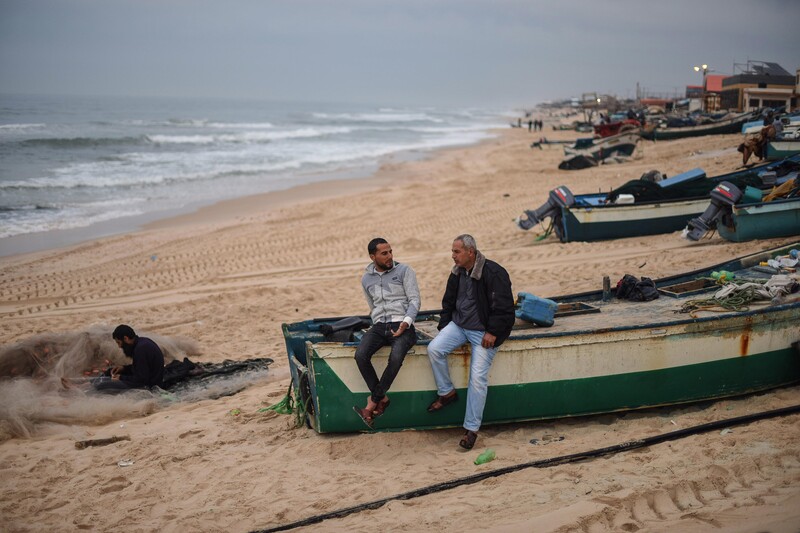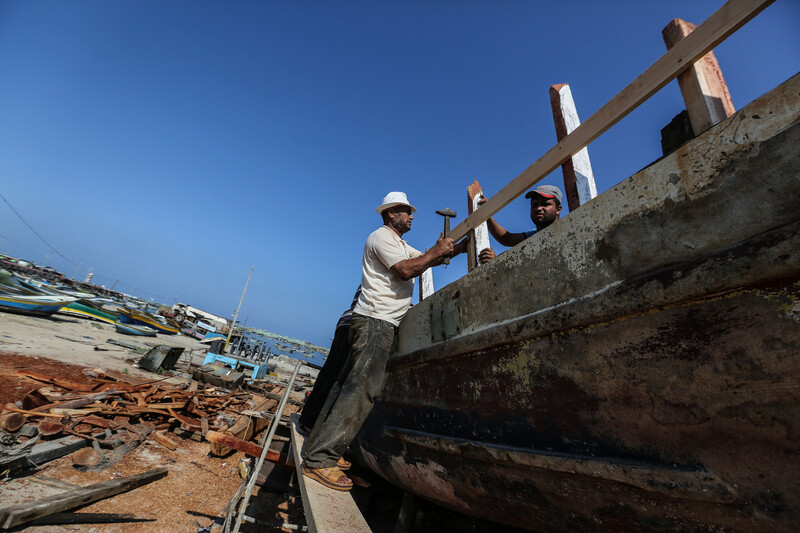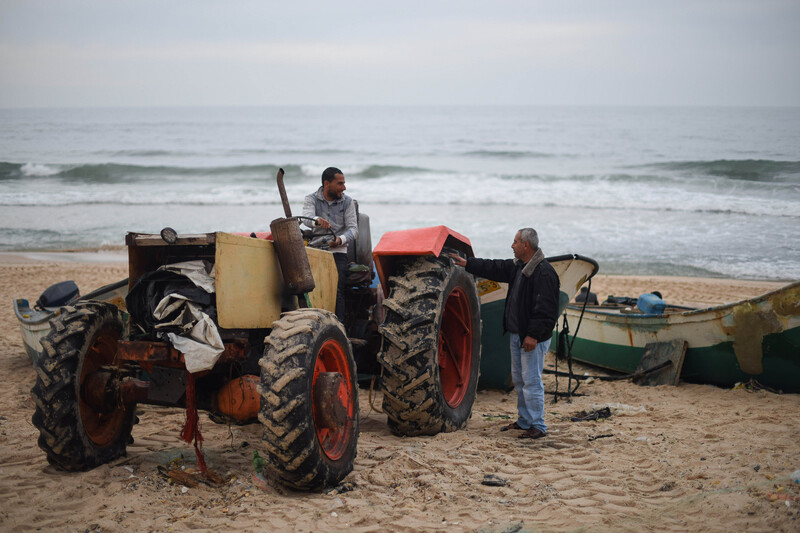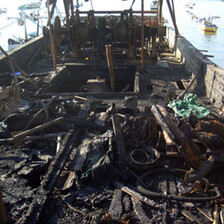The Electronic Intifada 17 February 2020

Jamil al-Najjar (left) is being trained in how to make boats by his father Abdullah (not pictured).
The Electronic IntifadaAbdullah al-Najjar is the last boat maker in Gaza.
Fully aware that he plies a vanishing trade, Abdullah, 61, is nonetheless trying to keep it alive in a time-honored way. He is training his son Jamil, 25, so that his skills can be handed on to the next generation.
Abdullah himself began learning how to build boats when he was in his early teens. He was taught how to do so by an uncle.
“Boat making is almost nonexistent in Gaza today,” said Abdullah. “That is because of the high costs involved, the fact that raw materials are scarce and the restrictions placed on fishers.”
Gaza’s maritime traditions have deep roots.
In ancient times, a Greek port known as Antidon was established near present-day Gaza City. Fishing – particularly for tuna, sardines, shrimp and squid – has long been a key source of livelihood for Palestinians living along the coast.
Despite surviving for so long, the traditions are now at grave risk because of Israel’s policies.
The Oslo accords – signed between Israel and the Palestine Liberation Organization during the 1990s – allowed Gaza’s fishers to work in a zone that stretched for 20 nautical miles. In reality, Israel has never allowed fishers to venture beyond 15 miles of the coast.
Since the beginning of the second intifada in 2000 Israel has reduced the size of the zone repeatedly. The effect has been a sharp fall in the number of Gaza’s fishers – from approximately 10,000 in 2000 to just 3,500 in 2013.
Today Gaza has about 3,700 fishers, only 2,000 of whom go out to sea on a daily basis.
Under attack
The size of the zone in which fishing is permitted has continued to fluctuate. Israel introduced 20 changes to its demarcation in 2019 alone.
Earlier this month, the Israeli military announced that it was once again reducing the size of the zone. No fishers are allowed to go beyond 10 nautical miles of the coast; in areas south of Gaza’s port, the zone is only six nautical miles.
Israel stated that the reduction was imposed because rockets were being fired and incendiary balloons were being flown from Gaza. Yet Israel did not produce any evidence linking fishers to such actions.
The restrictions on fishers constitute collective punishment, which is illegal under international law.
Fishers have also been repeatedly attacked. The UN monitoring group OCHA has reported that during a two-week period in December, Israel opened fire on fishers off Gaza’s coast at least seven times, sinking one boat.

Abdullah al-Najjar (left) has worked more on mending boats than on making new ones in recent times.
The Electronic IntifadaThroughout his career, Abdullah al-Najjar has made around 30 trawlers. Such vessels are 17.5 meters long, 5.5 meters wide and 2.5 meters in height.
They can command a price of $70,000 each.
Abdullah’s business has nearly collapsed since Israel’s blockade on Gaza was severely tightened in 2007. He has made just two boats in the past 13 years; one of them was for use by his own sons.
“Fishers have stopped buying new boats,” he said. “And they can only mend their old boats when they get help from charities.”
Despite all these difficulties, “I have insisted on teaching my son how to make boats,” Abdullah added.

Jamil al-Najjar (at steering wheel) has only made one boat so far.
The Electronic IntifadaOf his 13 children, he chose Jamil as the inheritor of his skills.
“Jamil is so talented,” said Abdullah. “He reminds me of myself when I was young.”
“I need experience,” said Jamil. “So far, I’ve only been able to make one boat with my father. I need more practice.”
“Graveyard for boats”
Israel’s tightened siege of Gaza – now in its 14th year – has placed major obstacles in their way.
Israel has prevented a large number of goods from entering Gaza. As a result, vital components of and equipment for fishing vessels – such as nets, fiberglass, electric motors and steel ropes – are hard to obtain.
The shortages of materials and the generally dire economic situation in Gaza have also meant that Gaza’s fishers cannot carry out much-needed repairs on their boats.
Zakaria Baker from the Union of Agricultural Work Committees – which represents both farmers and fishers in Gaza – estimates that there are 300 boats that will not be seaworthy until they are mended.
“We keep them in a place that we call the ‘graveyard for boats,’” Baker said.
Israel has frequently confiscated the boats of Gaza’s fishers.
In 2016, Abdulmuti al-Habil’s trawler was attacked and seized by the Israeli navy. After a lawsuit was filed in Israel’s high court, his boat was eventually given back to him last year.
He went to collect the boat at Kerem Shalom, a military checkpoint between Israel and Gaza.
The court ordered, too, the release of 65 boats which had been seized from other fishers. They have been returned but often without engines and without equipment that was onboard at the time they were confiscated.
“My heart leaped with joy when they told me my boat was being released,” said al-Habil, who heads al-Tawfiq, a fisheries cooperative. “But my happiness didn’t last long. I was shocked when I saw my boat. It was almost destroyed.”
Israel had badly damaged the boat with its gunfire.
Al-Habil contacted Abdullah al-Najjar, who examined the boat. Mending it would cost $50,000, Abdullah calculated.
Al-Habil agreed to that price and received the repaired boat two months later. Both Nabil and Abdullah worked on repairing it.
Trawlers are not the only fishing vessels used in Gaza. Numerous fishers have gone to sea in a small boat known as the hassaka.
Gaza has three workshops for producing these boats, yet none of them is functioning at the moment.
The shortages of materials – especially fiberglass – has made the cost of production and, as a consequence, the retail price more expensive. Fishers would need $8,500 to buy a new hassaka in Gaza, a price that most of them cannot afford.
“The demand for hassakas is very weak,” said Mufeed Jarbou, who has made these boats for the past three decades. “Over the past four years, we have almost stopped producing them.”
Sarah Algherbawi is a freelance writer and translator from Gaza.





